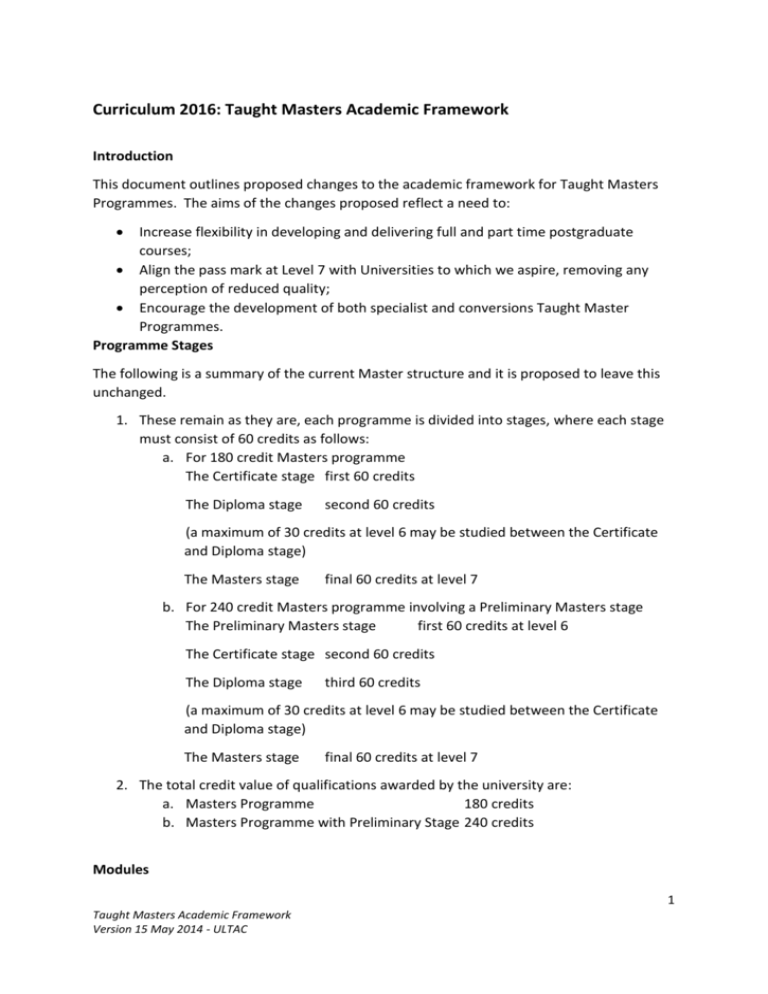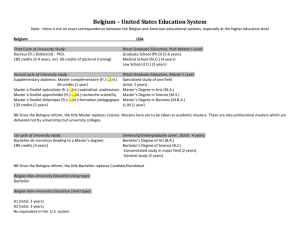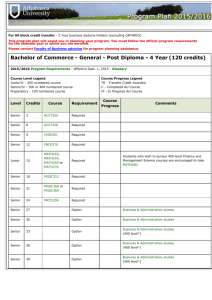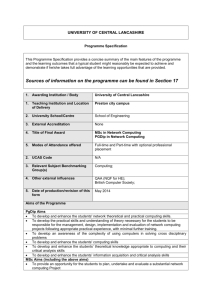Academic Framework - Taught Masters
advertisement

Curriculum 2016: Taught Masters Academic Framework Introduction This document outlines proposed changes to the academic framework for Taught Masters Programmes. The aims of the changes proposed reflect a need to: Increase flexibility in developing and delivering full and part time postgraduate courses; Align the pass mark at Level 7 with Universities to which we aspire, removing any perception of reduced quality; Encourage the development of both specialist and conversions Taught Master Programmes. Programme Stages The following is a summary of the current Master structure and it is proposed to leave this unchanged. 1. These remain as they are, each programme is divided into stages, where each stage must consist of 60 credits as follows: a. For 180 credit Masters programme The Certificate stage first 60 credits The Diploma stage second 60 credits (a maximum of 30 credits at level 6 may be studied between the Certificate and Diploma stage) The Masters stage final 60 credits at level 7 b. For 240 credit Masters programme involving a Preliminary Masters stage The Preliminary Masters stage first 60 credits at level 6 The Certificate stage second 60 credits The Diploma stage third 60 credits (a maximum of 30 credits at level 6 may be studied between the Certificate and Diploma stage) The Masters stage final 60 credits at level 7 2. The total credit value of qualifications awarded by the university are: a. Masters Programme 180 credits b. Masters Programme with Preliminary Stage 240 credits Modules 1 Taught Masters Academic Framework Version 15 May 2014 - ULTAC The current regulations state that: “Modules shall be of 20 credits, with the exception of modules constituting the Masters stage. Proposals to offer modules of credit values other than 20 credits shall be subject to the approval of the Programme Approvals Committee. Modules in the Masters stage shall be of 30 or 60 credits.” It is proposed that two models for developing a Masters programme be considered: 1. A 20 credit based structure identical to the model already adopted, allowing delivery of the Certificate and Diploma stage through six 20 credit modules. 2. A 30 credit based structure, allowing delivery of the Certificate and Diploma stage through four 30 credit modules. 3. The regulations relating to the Masters stage remain the same. 4. A mixture of 20 credit and 30 credit modules is not permissible at the Certificate and Diploma stages. The inclusion of a 30 credit model would allow the development modules with greater depth of material, delivered and assessed with a stronger research orientation. They may, in many situations, be more appropriate for programmes aimed at a part-time market, allowing a single 30 credit module to be taken each trimester and delivered over a two year period. However, the inclusion of existing Level 6 modules within a 30 credit structure is problematic and better suited to the existing 20 credit model. Module Marks It is proposed that the pass mark for all Level 7 modules be 50+. Level 6 modules taken as part of a Taught Masters programme will have a pass mark of 40+. Where current progression rules state that “a weighted average or 40 of greater” must be achieved, this will then be replaced with “a weighted average of 50 or greater”. Compensation, Condonement and Progression The regulations concerning progression, compensation and condonement for all undergraduate and postgraduate programme are the subject of a separate project and recommendations will be presented to ULTAC and Senate in October/November 2014. The following comments and questions are include to promote initial discussion rather than for decision at this time. It is proposed that the policy of compensation and condonement be reviewed, irrespective of the adoption of the additional 30 credit model outlined previously. If the current policy relating to compensation and condonement remains then the number of credits allowed will need to be considered in a 30 credit model: Should the 20 credit threshold be raised to 30 credits? Should both compensation and condonement be supported within a single Taught Masters Framework? 2 Taught Masters Academic Framework Version 15 May 2014 - ULTAC Should, for example, condonement be restricted to module where a student has achieved 40-49? Perhaps more controversially, is compensation/condonement appropriate in a Masters Programme? Should students achieve all Learning Outcomes and therefore be required to pass all modules? It is noted that when a module is compensated, credit is awarded, even when all the module Learning Outcomes have not been met. When a module is condoned, credit is not awarded. Authors: Derek Wills, Programme Director Curriculum 2016 Dr Elizabeth Cleaver, Director of Learning Enhancement and Academic Practice 3 Taught Masters Academic Framework Version 15 May 2014 - ULTAC








